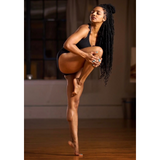After leaving ballet for 8 years besides a class here and there, I decided to begin taking class regularly again. I will never forget one particular ballet class I took after my long hiatus. We were beginning plies, and as I prepared my arm, the teacher was all over me, correcting me and even asking for 180 degree turnout at the earliest of class times. My initial thought was that I wanted to be given a few minutes (at least!) to tune in to what I was doing and how I was feeling before someone else stepped into my space. In the 8 years that had passed, I had begun a regular yoga practice, completed yoga teacher training, and taught yoga for 4 years. After such a long time away from ballet, I had forgotten some of the harsh ways we tend to treat our bodies, and allow others to treat our bodies (even if they have the best of intentions, as this particular teacher did.) I have endless respect and appreciation for the art of ballet, and learned so much from my training. It shaped me into the person I am today even though I am no longer dancing. What I learned through my 8 years off was that I am in charge of my body. If something doesn’t feel right, I learned to say no, or to take it slow as I learned something new. I learned never to force, and to be kind to myself. The re-entry back into the ballet world at the beginning of this particular class was of such serious shock value to me that I spent some significant time thinking about the differences between my ballet and yoga training, and how I feel the yoga practice could have benefitted me as a ballet dancer. (I can only speak from my own experience as everyone’s experience in their training, and viewpoints about how things can and should be done varies. I totally respect and understand that! Different mindsets make the world an interesting place!)
1) You are in charge.
While we might find a trusted yoga teacher along our path who kindly and patiently encourages us to grow and try new things that challenge us, in yoga, YOU are always in charge. In the yoga practice, we are encouraged to modify and take rest. I think the reason I was so shocked in my ballet class example was because after spending so many years learning to listen to my body’s signals, be kind to myself, and never force, I finally realized that I had never really been in charge of myself in a ballet class environment before. The teacher in my example was not trying to be harsh, she was trying to help me in the best way she knew how. But at that moment in class, there was no room for me to decide what my body was ready for. We should respect our teachers and look to them for guidance, as they are doing the best they can to help us become better dancers and artists. But, if you feel sometimes you are pushed too far in class, know that you are in charge of your body. While it might not be commonplace to set your limits in ballet class, I personally feel it is ok to let your teacher know you feel physically uncomfortable with something, and that you're trying your best, in a kind and respectful way. It took time (8 years!) for me to learn that I am in charge of my body. A regular yoga practice can help to remind you that it is ok to set limits, and it is important to listen to the signals your body gives you.
2) The practice of self-study and self-inquiry.
In the yoga practice, we use the yoga postures, called asanas, as tools to observe the mind and the inner self, to cultivate sight within. We notice our patterns. If I’m injured I might notice I always push myself through no matter what. I might notice that I am embarrassed or fearful of trying new postures in front of a group or even when I’m alone. I might notice that I dramatize sensations I am feeling in my body. The key in yoga is that there is no judgement. We merely learn to notice and be grateful for exactly where we are on our own path, because understanding where we are in the present moment can be our greatest teacher. We observe these things about ourselves and after noticing some of our own mental patterns, we can choose to make a different choice or to confront the reasons that we might be reacting one way or another. As ballet dancers, we have such focus on making beautiful lines and moving beautifully and precisely, that there is little time for connection with the self in the classroom. There is little time in our training to notice our patterns and work on clearing some of the mental blocks that can stunt our growth as artists, and possibly lead to burnout. One of the many intentions of yoga is a lifelong journey and commitment to noticing these things I have mentioned about ourselves, and allowing what we learn to lead us in being more compassionate human beings to both ourselves and others. To grow as a dancer and person, know yourself.
3) Emphasis on daily practice.
The language we use to describe what we do each day is significant. As dancers, we attend class (or multiple classes!) each day. The yogi goes to practice. I feel there are positive aspects to using both terms, and as a yogi, I sometimes wish I went to yoga “class” as well as “practice” to remind myself that I am always a student. The sense of humility that flourishes by seeing yourself as a “student for an entire career” (I attribute this phrase to Dylan Duke, soloist with Ballet San Antonio) can be profound and meaningful. Practice means you are always learning and growing. Practice means it is ok not to be perfect and to falter and fail.
In ballet, I never felt that I learned (at least in my experience) that I just had to practice. Many of my teachers were interested in a certain outcome, but never really helped me to understand the process of practice, and I never learned to be ok with not being "perfect" right away. Obviously, there are people who have the god-given facility, but I never understood that I just had to practice and my body would change over time. I thought if my extension was "bad," that was it. In yoga, I really learned that with patience and practice, your body and mind will change without the use of force, like we sometimes use in ballet. I really believe that (brain and other physical deformities aside) with practice, you can achieve anything you put your mind to. Clearly, people living in poverty and other marginalized groups might not have the same opportunities or financial ability to hone a craft or attend certain educational institutions, but for those of us living in the first world middle or upper class, I believe this is pretty much universally true. My husband has a PhD in math, and he always talks about how the people who are good at math are the people who do it all the time. While clearly some people have more of an affinity for math than others at first, if someone who claimed they are “bad at math” spent 40 hours per week for 30 years doing math, they probably wouldn't feel the same way after years of practice. I see beginners in my yoga classes get so discouraged that they can't do something immediately and compare themselves to people who have been practicing for many years. The disconnect they are feeling is due to the many hours and years of practice that someone who can do a challenging posture right away has already put in. I believe that even our own "disabilities" can turn out to hone our strengths, and we can focus on how they limit us, or how they can actually help us become who we are and develop our expertise (a la Malcolm Gladwell.) Begin a daily yoga practice and see your whole mindset on practice change.



1 comment
Nice article, very thought provoking!